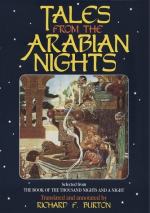B.—Woman.
The next point I propose to consider is the position of womanhood in The Nights, so curiously at variance with the stock ideas concerning the Moslem home and domestic policy still prevalent, not only in England, but throughout Europe. Many readers of these volumes have remarked to me with much astonishment that they find the female characters more remarkable for decision, action and manliness than the male; and are wonderstruck by their masterful attitude and by the supreme influence they exercise upon public and private life.
I have glanced at the subject of the sex in Al-Islam to such an extent throughout my notes that little remains here to be added. Women, all the world over are what men make them; and the main charm of Amazonian fiction is to see how they live and move and have their being without any masculine guidance. But it is the old ever-new fable
“Who drew the Lion vanquished? ‘Twas a man!’’
The books of the Ancients, written in that stage of civilisation when the sexes are at civil war, make women even more than in real life the creatures of their masters: hence from the dawn of literature to the present day the sex has been the subject of disappointed abuse and eulogy almost as unmerited. Ecclesiastes, perhaps the strangest specimen of an “inspired volume” the world has yet produced, boldly declares “One (upright) man among a thousand I have found; but a woman among all have I not found” (vol. vii. 28), thus confirming the pessimism of Petronius:—
Femina
nulla bona est, et si bona contigit ulla
Nescio
quo fato res male facta bona est.
In the Psalms again (xxx. 15) we have the old sneer at the three insatiables, Hell, Earth and the Parts feminine (os vulvae); and Rabbinical learning has embroidered these and other texts, producing a truly hideous caricature. A Hadis attributed to Mohammed runs, “They (women) lack wits and faith. When Eve was created Satan rejoiced saying:—Thou art half of my host, the trustee of my secret and




